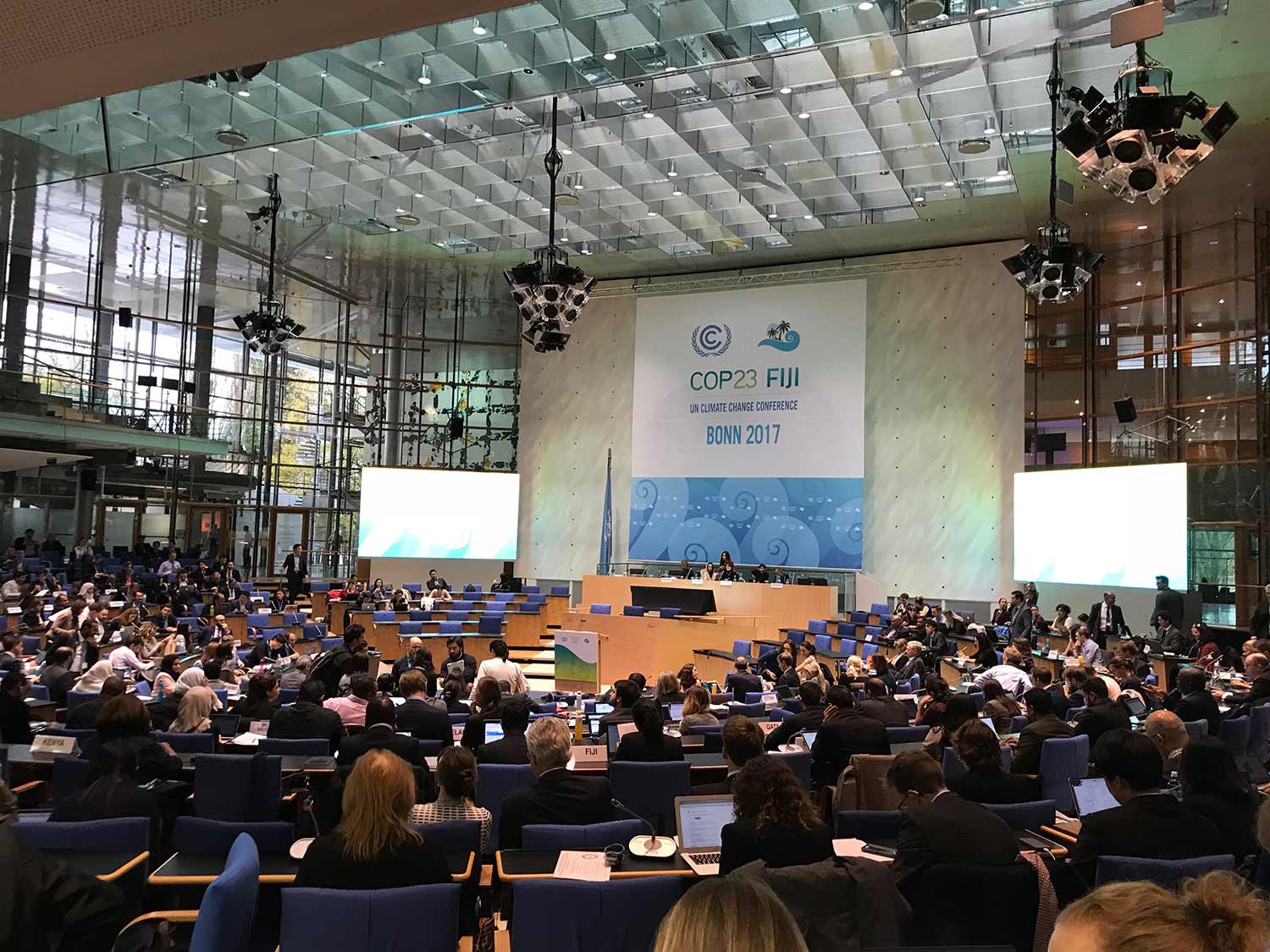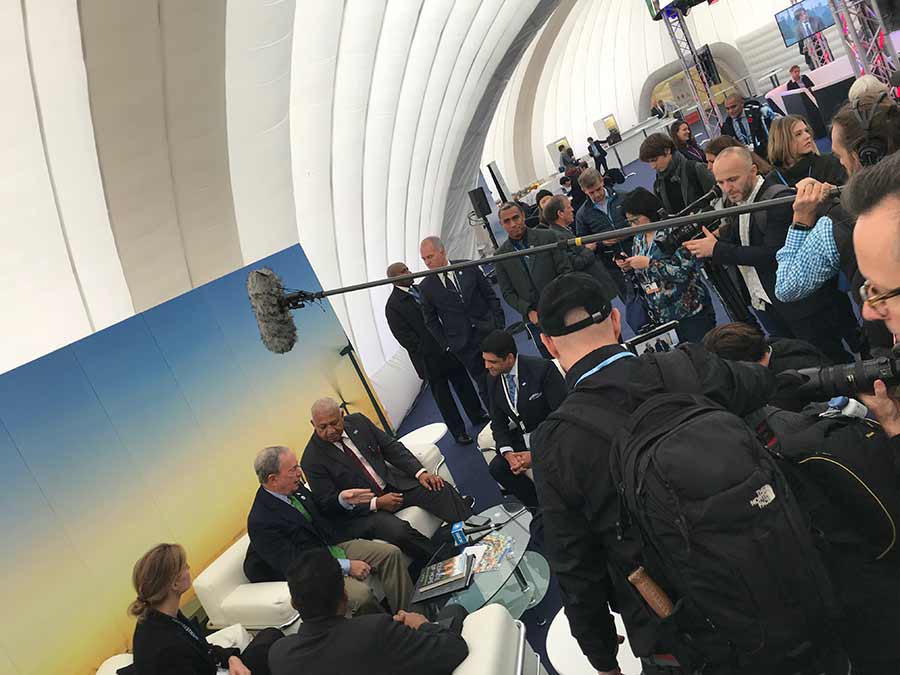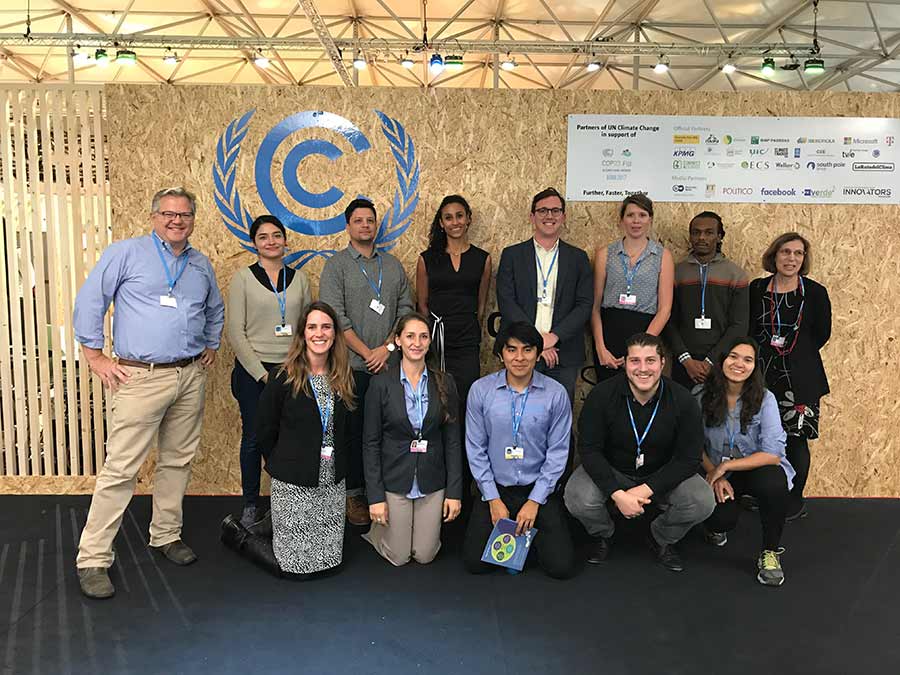
By:
- Robert Monroe
Published Date
By:
- Robert Monroe
Share This:

A negotiation session during COP23. The annual international negotiations on curbing climate change were hosted by the United Nations in Bonn, Germany.
UC San Diego Helps Fill U.S. Void at International Climate Talks
In contrast to conspicuously low profile of federal government, university joined state leaders in reaffirming commitment to mitigate and adapt to climate change
Countries grappled with uncertainty on how best to proceed in the global fight to reduce greenhouse gas emissions this month at the international climate negotiation known as COP23.
The absence of the United States from its typical place of prominence as a leader of the fight added to the murkiness. Continuing bad news from the front lines of climate research and the announcement earlier this year by President Donald Trump of his intention to withdraw from the Paris Agreement—a 2015 pledge among countries to make “nationally determined contributions” (NDCs) to address climate change—heaped on a sense of anxiety at the talks held in Bonn, Germany.
At least on some fronts, however, UC San Diego delegates at the event found reason for optimism. As students of policy and chroniclers of accelerating climate instability, they drew inspiration from California Gov. Jerry Brown, former Gov. Arnold Schwarzenegger, and other U.S. state leaders who argued there that it is too late to stop a drive toward renewable energy and sustainable economy regardless of what happens at the federal level. Representatives from Scripps Institution of Oceanography were especially encouraged to see increasing recognition of the world’s oceans as an asset worth preserving.
“My sense is that ocean scientists are becoming more engaged in ‘science diplomacy’ and also moving beyond assessment of climate impacts and turning their attentions increasingly to solutions,” said Scripps biological oceanographer and COP23 attendee Lisa Levin. “It is also encouraging to see state-academic collaborations grow, and the increasing engagement of youth constituencies. Chile and France in particular are two countries that seem to embrace both.”

New York Mayor Michael Bloomberg and Fijian Prime Minister Frank Bainimarama, whose country was the official host of COP23, field questions from reporters at a pavilion hosted by a group of American business and government leaders advacing an initiative called America’s Pledge. The pavilion, which did not represent the official U.S. government delegation, was among the popular locales during the two-week event. The annual international negotiations on curbing climate change were hosted by the United Nations in Bonn, Germany.
UC San Diego sent 23 students, faculty members, and staff to the negotiations. Known formally as the 23rd Conference of the Parties, the talks were hosted by the government of Fiji but held this year at United Nations facilities in Bonn, which were more accessible and better suited to host the nearly 29,000 visitors the event drew. The University of California has been represented at the international climate talks since 2001 by the non-governmental organization UC Revelle Program on Climate Science and Policy. In all, 31 people from the UC attended this year.
As in years past, the presence of UC San Diego students at the event was meant to afford the oceanographers, marine biologists, and climate scientists of Scripps and the international affairs students of UC San Diego’s School of Global Policy and Strategy an inside view of the United Nations Framework Convention on Climate Change (UNFCCC). It was a chance for the students to infuse negotiations with their own expertise while seeing how that science works its way into policy. Attendance at COPs is for Scripps Oceanography a chance to introduce to an international audience technologies for observing changes in the oceans and atmosphere and to spread the use of those technologies to new countries. On display at the UC Revelle exhibit were samples of ancient ice from Antarctica, surfboard-mounted Smartfin instruments, and a replica of the floats used in the Argo network that has transformed ocean research in the past two decades.
The U.S. State Department has typically been prominent at previous COPs, erecting large pavilions on the grounds of COP venues filled with high-tech exhibits and showcasing climate science and policy talks. This year, there was no such pavilion but in compensation, an organization called America’s Pledge, led by New York Mayor Michael Bloomberg, erected an inflatable arena resembling an igloo just beyond the confines of COP conference rooms. The site was among the most popular of the event despite its unofficial stature.
Frederick Hemans, who is pursuing a master’s degree in international affairs at the School of Global Policy and Strategy, said COP23 provided “a tremendous opportunity to hear directly from industry and policy leaders, as well as participate in official events and demonstrations of some of the innovative work done at Scripps and other places.”

Students and faculty from UC San Diego’s Scripps Institution of Oceanography and School of Global Policy and Strategy at the COP23 venue.
“As Gov. Brown pointed out, the U.S. is on track to meet its Paris Agreement mitigation goals regardless of a lack of leadership from Washington D.C.,” said Hemans. “Market forces are moving towards renewable energy and a reduction of greenhouse gases across the globe. Now is the time for NGOs and research institutions like UC San Diego to step into the leadership void and provide more solutions and innovations in the coming years.”
Scripps researchers continued a relationship with Chile’s Ministry of Foreign Affairs that started at the 2015 version of the climate talks known as COP21, the iteration of the conference at which the Paris Agreement was forged. The two entities co-hosted a presentation of science and policy perspectives on threats to world oceans posed by climate change. The Chilean government, which introduced the “Because the Ocean” declaration that year, channeled Scripps research at COP23 as it added more signatories to the document, which highlights the need to protect oceans and the segment of the global economy that depends on them. An analysis of how many countries acknowledge the oceans in their NDCs by Scripps researchers drew widespread attention among countries especially dependent on the oceans.
The analysis, led by Scripps Oceanography graduate student and former COP attendee Natalya Gallo, was released in the journal Nature Climate Change one week before the Nov. 6 start of COP23.
“I have heard references from many people that have used it as an authoritative source to understand the potential of the inclusion of the ocean in NDCs and also in detecting some trends in the way Parties have expressed this interest,” said Julio Cordano, a member of Chile’s negotiation team.
Fiji furthered the drive to relate the oceans to climate change more strongly, using its one-year COP presidency to introduce “The Ocean Pathway,” an initiative that among other things could make accessible greater funding for maintenance of critical ocean ecosystems through UNFCCC mechanisms such as the Green Climate Fund.
Share This:
You May Also Like
Stay in the Know
Keep up with all the latest from UC San Diego. Subscribe to the newsletter today.


